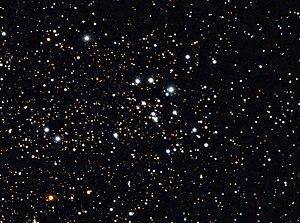| Messier 18 | |
|---|---|
 Open cluster Messier 18 in Sagittarius | |
| Observation data (J2000.0 epoch) | |
| Right ascension | 18h 19m 58.0s[1] |
| Declination | –17° 06′ 06″[1] |
| Distance | 4.23 kly (1.296 kpc)[2] |
| Apparent magnitude (V) | 7.5[3] |
| Apparent dimensions (V) | 9.8′[4] |
| Physical characteristics | |
| Mass | 186+161 −86[5] M☉ |
| Radius | 26.2 light-years[5] |
| Estimated age | 33×106 years[6] |
| Other designations | Messier 18, NGC 6613, Cr 376, OCl 40[7] |
| Associations | |
Messier 18 or M18, also designated NGC 6613 and sometimes known as the Black Swan Cluster, is an open cluster of stars in the constellation Sagittarius. It was discovered by Charles Messier in 1764 and included in his list of comet-like objects.[8] From the perspective of Earth, M18 is situated between the Omega Nebula (M17) and the Small Sagittarius Star Cloud (M24).[3]
This is a sparse[9] cluster with a linear diameter of 8.04 pc,[5] a tidal radius of 7.3 pc,[6] and is centrally concentrated with core radius of 0.012 pc.[10] It has a Trumpler class of II 3 p.[4] The cluster is 33[6] million years old with an estimated mass of 188 M☉.[5] It has one definite Be star and 29 B-type stars in total.[9] There are three supergiant stars, all of class A or earlier.[11] The brightest component (lucida), designated HD 168352, is a B-type giant star with a class of B2 III and a visual magnitude of 8.65.[4]
Messier 18 is 1,296 kpc[2] from the Earth and 6,830 kpc from the Galactic Center.[5] It is orbiting the Milky Way core with a period of 186.5 million years and an eccentricity of 0.02. This carries it to as close as 6.5 kpc to, and as far as 6.8 kpc from the galactic core. It passes vertically through the galactic plane once every 27.4 million years, ranging no more than 80 pc above or below.[1]
As of January 2022, Messier 18 is one of the few remaining objects within the Messier Catalog to not have been photographed by the Hubble Space Telescope. [12]
- ^ a b c Cite error: The named reference
Wu2009was invoked but never defined (see the help page). - ^ a b Cite error: The named reference
kharchenko2005was invoked but never defined (see the help page). - ^ a b Cite error: The named reference
Frommert2007was invoked but never defined (see the help page). - ^ a b c Cite error: The named reference
Lindoff1971was invoked but never defined (see the help page). - ^ a b c d e Cite error: The named reference
Joshi2016was invoked but never defined (see the help page). - ^ a b c Cite error: The named reference
Piskunov2008was invoked but never defined (see the help page). - ^ Cite error: The named reference
SIMBADwas invoked but never defined (see the help page). - ^ Cite error: The named reference
Adam2018was invoked but never defined (see the help page). - ^ a b Cite error: The named reference
McSwain2005was invoked but never defined (see the help page). - ^ Cite error: The named reference
Silva2012was invoked but never defined (see the help page). - ^ Cite error: The named reference
Eggenberger2002was invoked but never defined (see the help page). - ^ "Explore - the Night Sky | Hubble's Messier Catalog". 28 August 2017.